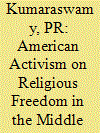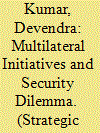| Srl | Item |
| 1 |
ID:
181176


|
|
|
|
|
| Summary/Abstract |
Since its enactment in October 1998, the International Religious Freedom Act has become a major instrument to further the American foreign policy agenda in the Middle East and elsewhere. While the annual reports are a great source of information on lesser-known facts and shifts concerning religious minorities, they also underscore an inherent bias in favour of Christian missionaries, politicization of the minority question and American exceptionalism. Until there is an inclusive alternative, the Religious Freedom Reports of the US State Department are a good source of information to be used with caution.
|
|
|
|
|
|
|
|
|
|
|
|
|
|
|
|
| 2 |
ID:
181178


|
|
|
|
|
| Summary/Abstract |
On February 18, SKY News UK trumpeted that ‘Lockdown is working! COVID-19 infection rate plummets in England’. Yet, as Figure 1 shows, Sweden with voluntary social distancing guidelines experienced an earlier and faster decline of COVID deaths per capita. The other interesting feature about the figure is how the mortality curves are policy-invariant, mimicking one another regardless of policy interventions between Sweden, the UK and the EU countries. The virus infection, hospitalization and mortality curves seem to rise and fall by seasons, independent of lockdowns.
|
|
|
|
|
|
|
|
|
|
|
|
|
|
|
|
| 3 |
ID:
181175


|
|
|
|
|
| Summary/Abstract |
How do humanitarian norms and national security concerns shape a host state refugee policy? This article addresses this question in the context of Bangladesh, the largest host state in the world for Rohingya refugees. It argues that although the norms of humanitarian protection can explain why a host state would open its border to forced migrants and allow relief agencies access to the refugee camps, humanitarianism alone cannot explain the full gamut of a state’s refugee policy. Instead, a better and fuller account of the refugee policy would require understanding the national security concerns of the host state, and the process through which such concerns lead to restrictive policies. These competing theoretical explanations are tested in the context of the pre- and post-2017 Rohingya refugee influxes. Findings reveal how altruistic sentiments towards the Rohingya people have historically been overshadowed by denial of refugee status and restricted mobility in camp-based settlements, a recent relocation plan, and the search for repatriation to Myanmar as the most viable solution to the Rohingya refugee crisis.
|
|
|
|
|
|
|
|
|
|
|
|
|
|
|
|
| 4 |
ID:
181177


|
|
|
|
|
| Summary/Abstract |
The article attempts to explain India’s contrasting strategic choices with regard to China-led initiatives in South Asia. While India chose to join the AIIB, it has opposed the BRI. While the India–China relationship has been defined by the security dilemma for long, China’s involvement in the region makes the security dimension even more salient. More so, because infrastructure connectivity projects change the existing relations of power and influence. It is argued here that India’s choice to join the AIIB can be explained by its inclusive and transparent governance structures that help decouple China’s strategic intentions from the projects funded by the Bank. In contrast, the BRI does not have inclusiveness and transparency, which stokes India’s security concerns.
|
|
|
|
|
|
|
|
|
|
|
|
|
|
|
|
| 5 |
ID:
181174


|
|
|
|
|
| Summary/Abstract |
Russia’s policy on Afghanistan has witnessed considerable transformation during the last two decades. This has allowed Moscow to change its stance towards the Taliban from confrontation to accommodation. The article explains Russia’s foreign policy trajectory towards Afghanistan, exploring the key determinants, approaches and potential outcomes. Drawing mainly on secondary sources as well as the statements of officials and experts, the article also seeks to highlight the recent trends in Russia’s Afghan policy. Against the backdrop of changing regional geopolitics, the analysis is likely to be useful for the Indian government which is recalibrating India’s own stance in the changing circumstances.
|
|
|
|
|
|
|
|
|
|
|
|
|
|
|
|